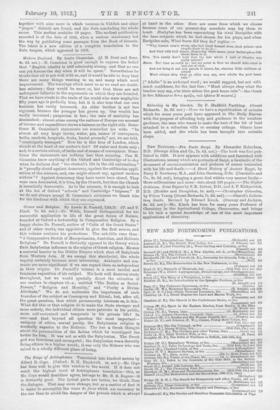Modern England. By Louis Cazamian. (j. M. Dent and Sons.
4s. 6d. net.)—M. Cazandan is good enough to express the belief that "English vitality is still admirably strong, and that no one can yet foresee the day when it will be spent." Nevertheless he thinks that all is not well with us, and it would be idle to deny that there are many 'things wanting to us, and many which need improvement. The warnings which meet us as we read are doubt- less salutary ; they would be more so, but that there are not unfrequent fallacies in the arguments on which they are founded. That we have rivals in the trade of the world who were negligible fifty years ago is perfectly true, but it is also true that our own business has vastly increased. An elder brother is not less vigorous, because the younger has grown up. Our wealth has vastly increased ; pauperism is less ; the rate of mortality has diminished ; almost alone among the nations of Europe our account of income and expenditure shows a balance on the right side. Some- times M. Cazamian's statements are somewhat too wide. "In almost all very large towns, water, gas, means of conveyance, baths, markets, hospitals, docks, burial grounds," are, we are told, "municipally managed." How far is this true of London, which stands at the head of our author's list P Of water and docks only ; and, to a certain extent, of baths and of means of conveyance. Some- times the statements are nothing less than amazing. Can M. Cazamian know anything of the Oxford and Cambridge of to-day when he declares that "the student's life in the old universities" is"proudly closed against democracy, against the utilitarian appli- cation of the sciences, and, one might almost say, against modern culture " P Against democracy they have never been closed. They were once dominated, it is true, by the Church, but then the Church is essentially democratic. As to the sciences, it is enough to look at the list of Oxford "schools" and Cambridge " triposes." If we do not always accept M. Cazamian's criticisms we thank him for the kindness with which they are expressed.










































 Previous page
Previous page